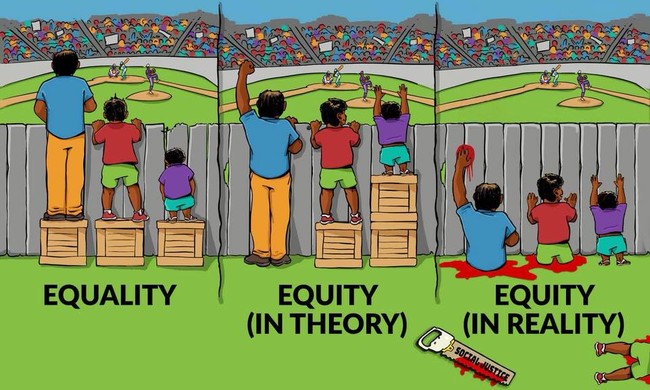In an opinion piece published today, a pair of Stanford academics argue that DEI is not working on college campuses. In fact, they argue that DEI as currently constituted is likely to be doing more harm than good. To solve this problem, they offer an alternative version of DEI which does away with the oppressor-oppressed framework present in most DEI trainings today.
There's an effort in this piece to frame the authors as staking out a reasonable middle ground. The main thrust is a disagreement with the dominant, progressive version of DEI, but they want to also signal disagreement with conservative critics of DEI.
In recent years, the goals of diversity and inclusion have become the bête noire of the political right, in part to avoid reckoning with our nation’s history of slavery and discrimination in ways that might cause, as some state laws have put it, “discomfort, guilt or anguish.” We do not share this view. We believe that fostering a sense of belonging among students of diverse backgrounds is a precondition for educational success. That said, many D.E.I. training programs actually subvert their institutions’ educational missions.
Frankly, this is a bit irritating. As someone who is very familiar with the feelings of the political right toward DEI, I can tell you that the focus has not been on "the goals of diversity and inclusion." The idea that anyone, from any race or background, should get a fair shot is not something conservatives object to. Instead, the main focus of conservative ire has been on the thing the authors left out of the paragraph above, equity.
As you likely already know, equity is not the same thing as equality. Equality means treating everyone the same. Equity means treating people differently in order to produce equal outcomes. This meme sort of sums up the conservative view of equity, what it promises and what it actually delivers.
 But this is more than just a meme. There are real world examples from the field of education that we could consider here. For instance, San Francisco's decision to stop offering algebra to students in 9th grade. This was done explicitly to create equity and help close the achievement gap in schools. In reality, the data shows it did nothing to help low-performing students but it did make things much more difficult for high-performing students who now had to take a year of math in the summer (or take two sections of math simultaneously as freshmen) in order to reach higher levels of math by their senior year. San Francisco's experiment in "de-tracking" for equity did not work and it was eventually abandoned.
But this is more than just a meme. There are real world examples from the field of education that we could consider here. For instance, San Francisco's decision to stop offering algebra to students in 9th grade. This was done explicitly to create equity and help close the achievement gap in schools. In reality, the data shows it did nothing to help low-performing students but it did make things much more difficult for high-performing students who now had to take a year of math in the summer (or take two sections of math simultaneously as freshmen) in order to reach higher levels of math by their senior year. San Francisco's experiment in "de-tracking" for equity did not work and it was eventually abandoned.
Additionaly, the claim in the excerpt above that this is all about avoiding a reckoning with the country's history of discrimination is also not true. The anti-DEI law passed in Florida, for instance, explicitly required the teaching of slavery and other historical topics. Where laws like this have attempted to draw a line is at teaching white students specifically that they should feel personally responsible for these historical failures. And it turns out the authors of this piece agree that is not a good approach.
D.E.I. programs often assign participants to identity categories based on rigid distinctions. In a D.E.I. training program at Stanford a few years ago, Jewish staff members were assigned to a “whiteness accountability” group, and some later complained that they were shot down when they tried to raise concerns about antisemitism. The former D.E.I. director at a Bay Area community college described D.E.I. as based on the premises “that the world is divided into two groups of people: the oppressors and the oppressed.” She was also told by colleagues and campus leaders that “Jews are ‘white oppressors,’” and her task was to “decenter whiteness."
Rather than correcting stereotypes, diversity training too often reinforces them and breeds resentment, impeding students’ social development. An excessive focus on identity can be just as harmful as the pretense that identity doesn’t matter. Overall, these programs may undermine the very groups they seek to aid by instilling a victim mind-set and by pitting students against one another.
If they looked into it a bit more, I think the authors would find that most conservatives agree that shoehorning people into the category of "oppressor" is counterproductive and not just for Jewish students. And on the other end of this, encouraging minorities to feel resentment toward their teenage classmates is not a positive way to teach history. The authors may not know it, or may be hesitant to admit it, but they are basically in agreement with conservative DEI critics.
So what's the alternative? They recommend doing away with the oppressor-oppressed framework that is the core of most DEI training.
At the core of pluralistic approaches are facilitated conversations among participants with diverse identities, religious beliefs and political ideologies, but without a predetermined list of favored identities or a preconceived framework of power, privilege and oppression. Students are taught the complementary skills of telling stories about their own identities, values and experiences and listening with curiosity and interest to the stories of others, acknowledging differences and looking for commonalities.
If you leave out the "facilitated conversations" part of this, you're really talking about the process of making friends. This should happen naturally in an environment where people are not being categorized and pitted against one another from day one.
In any case, ditching the privilege and oppression framework is not something most DEI trainers are going to be willing to do. This is the core of their message. Without the concepts of white privilege and minority oppression, most of them would have nothing to say.
I want to give credit where due. I think the authors are basically correct about DEI. They have accurately identified the core of what is wrong with the current training being given on campuses around the country (and in corporations). That said, the ideologues who get degrees in grievance studies fields and who then join the growing cadres of DEI administrators who make a living pushing everyone to adopt this particular lens are not going to accept this new approach. To be blunt, I think they will stick with the privilege and oppression framework until they are dragged, kicking and screaming, from the campus and told never to return.








Join the conversation as a VIP Member